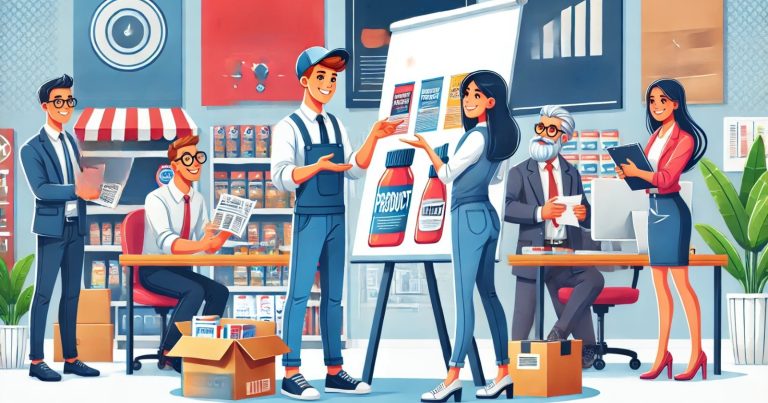Trade promotion is a marketing activity companies employ to increase sales, improve product exposure, and induce retailers and wholesalers to stock and sell the product. Companies offer discounts, special deals, and other incentives to distributors and retailers to increase demand. This increases sales volume and brand recognition for manufacturers, wholesalers, and retailers. This article deals with trade promotion, types of trade promotion, importance, and real-life examples.
What is Trade Promotion?
Trade promotion involves marketing activities by manufacturers and wholesalers to encourage retailers and distributors to buy and sell their products. These promotions increase the business’s ability to attract customers, increase the visibility of the products, and, consequently, sales performance.
Trade promotion is a type in which the retailer is given rebates, incentive rewards, or free products. It accelerates sales quickly and ensures that the product reaches the store efficiently. Consumer promotions focus on wholesalers, dealers, and retailers. However, it differs from consumer promotions because businesses use them for mass purchases and continuous supply chains.
Launching the new product is essential and includes trade promotions, as such promotions compel retailers to stock and promote new products to attain maximum visibility, increasing sales. These enable the manufacturers to stay in their shops while being on good terms with the distributors. Since this is a short-term promotion, there is more stress on short-term sales development than branding for the future here.
Department for Promotion of Industry and Internal Trade
The DPIIT, or Department for Promotion of Industry and Internal Trade, is one such department that fosters economic growth by formulating policies conducive to the development of the industrial sector, thereby boosting internal trade in India. This department focuses on creating a positive business environment and attracting investments across various sectors with innovation. DPIIT further aims to improve the regulatory process and ease of business and develop strategies for building internal and external trade. The department places India at the centre of global trade to increase industrial competitiveness and support new startups.
India Trade Promotion Organisation
ITPO (India Trade Promotion Organisation) is the flagship trade promotion agency of the Government of India and is dedicated to enhancing the country’s trade in domestic and international markets. It organises fairs, exhibitions, and business events demonstrating India’s export potential and help Indian businesses reach global markets. ITPO provides networking opportunities, promotes Indian products and services, and facilitates SMEs in reaching more people. As part of strategic initiatives, ITPO contributes highly to improving India’s trading competitiveness at a global level.
Trade Promotion Council of India
TPCI (Trade Promotion Council of India) is an organisation that is responsible for the promotion of Indian trade and industry across the world. The organisation coordinates its activities with the business firms concerned, governmental departments, and other international stakeholders towards discovering new opportunities in global markets, increasing exports, and making Indian products more visible in international trade. TPCI organises trade fairs, B2B meetings, international exhibitions, and buyer-seller meetings to interface Indian exporters with global buyers directly. TPCI is crucial in driving India’s trade growth and strengthening its position in the international marketplace by providing market intelligence, policy advocacy, and strategic support.
Types of Trade Promotion
Several trade promotions are designed to favour a retailer and manufacturer. The strategies help businesses create awareness and sales for their products.
Discount and Allowance
Retailers are usually offered a discount or allowance when they purchase large quantities of products. They, therefore, manage to save more money and stock more goods. Some common types include quantity discounts on the purchase of large amounts, cash discounts on payment in advance, and seasonal discounts for festivals, among others.
Free Products and BOGO Offers
Free products are given to the manufacturers so that retailers buy more stock. BOGO offers help clearing the old inventory and attracting more customers. These promotions increase sales and create excitement among buyers.
Trade Contests and Incentives
There are contests that reward sales representatives and retailers. This goes in terms of cash, gift vouchers, or travel rewards. Such incentives spur the sales representatives to sell more and to hawk certain products.
Trade Shows and Exhibitions
Businesses attend trade fairs and exhibitions to showcase their products to new retail partners. These are avenues through which companies can introduce new products, strengthen retailer relationships, and receive distributor bulk orders.
Store Display Promotions
They provide support to the retailers in developing attractive in-store displays. These include endcap displays at the end of aisles, point-of-purchase (POP) displays near checkout counters and large window displays at store entrances. Well-designed displays attract the customer’s attention and increase sales.
Cooperative Advertising
Manufacturers and retailers share advertising costs to promote a product. This strategy includes TV and radio commercials with retailers’ branding and social media campaigns sponsored by manufacturers, billboards, or newspapers co-financed between the two.
Sponsorship of Retail Events
Companies sponsor events in stores, festivals, or community-based activities to spread their brand into people’s hearts. These marketing programs attract more people to retail shops and create huge resonance with local markets.
Digital Trade Promotions
With the rise in online shopping, manufacturers now offer special deals to digital retailers. This ranges from sponsored ads on marketplaces like Amazon and Flipkart to discount codes and exclusive online flash sales. Such promotions attract more buyers to the retailers, thus increasing sales.
Importance of Trade Promotion
Trade promotion is crucial for companies to grow in a competitive marketplace. It benefits the manufacturers, wholesalers, and retailers through increased sales and a healthy relationship.
- Increase the Quantities of Sales Sold: Trade promotions force the dealer to buy more stock quantities, increasing sales. More convincing offers to their buyers ensure the buyers.
- Increases Brand Awareness: In-shop displays, price cuts, and advertising make more products visible to consumers. Relevantly placed promotion enhances brand consciousness among the customer.
- Strengthens Retailer Relationships: Trade promotions make retailers more willing to stock and promote a brand. Retailers prefer working with manufacturers who offer incentives and financial support.
- Facilitates Product Launches: The new products will face intense market competition. Trade promotion encourages the retailer to carry and promote new goods.
- Reduces overstock: The discounts on the trade offer clear up the unsold stock. The BOGO offers free products to help you make a bulk purchase.
Examples of Trade Promotion
Many firms apply trade promotion to strengthen their market share and sales. Some examples:
- Bulk purchases by D-Mart: D-Mart offers bulk purchase discounts to its customers while receiving significant trade discounts from the manufacturers. Therefore, D-Mart sells goods at a lower price than its competitors.
- Sponsored product listings: Amazon India brands pay for sponsored ads. This increases visibility for the retailers and pushes the sales online.
- Retailer Incentives by Coca-Cola: Coca-Cola gives cash incentives and free stock to retailers who meet sales targets. This will make the stores focus on selling Coca-Cola products rather than other competitors.
- Samsung Trade Show Promotions: At the tech expos, Samsung displays its latest models of smartphones and gizmos. Dealers and distributors order in bulk at discounted rates.
- In-Store Promotions at Big Bazaar: The company calls the FMCG brands to create endcap displays and discount zones in its stores. A consumer is likely to buy what he finds in such promotion sections.
Trade Promotion FAQs
1. What is trade promotion?
Manufacturers and wholesalers use a marketing strategy to get retailers and distributors to carry and sell the products they manufacture or distribute.
2. Why do businesses need trade promotion?
Businesses increase sales through promotions, improve brand awareness, create a rapport with retailers, and remove excess stock.
3. What is Karnataka Trade Promotion Organisation (KTPO)?
The Karnataka Trade Promotion Organisation is the government organisation promoting trade and commerce in Karnataka. It organises trade fairs, exhibitions, and business events to support local industries.
4. What is the Tamil Nadu Trade Promotion Organisation?
The Tamil Nadu Trade Promotion Organisation (TNTPO) aims to develop trade in Tamil Nadu through fairs, expos, and business networking activities that link up local businesses with national and international markets.
5. Who is the strongest supporter of trade liberalization?
The World Trade Organization is the most ardent advocate of trade liberalization, which seeks to reduce trade barriers and encourage free, fair, and open international trade.


